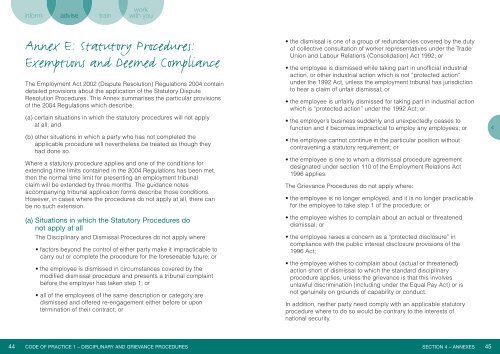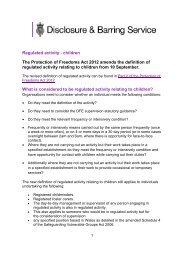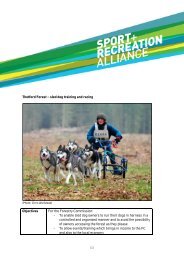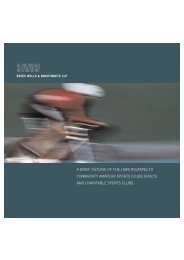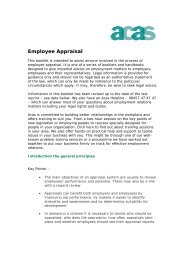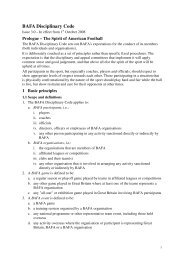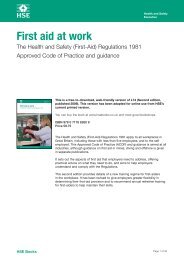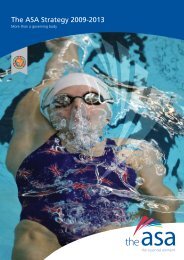Disciplinary & Grievance Procedures - Acas
Disciplinary & Grievance Procedures - Acas
Disciplinary & Grievance Procedures - Acas
You also want an ePaper? Increase the reach of your titles
YUMPU automatically turns print PDFs into web optimized ePapers that Google loves.
Annex E: Statutory <strong>Procedures</strong>:Exemptions and Deemed ComplianceThe Employment Act 2002 (Dispute Resolution) Regulations 2004 containdetailed provisions about the application of the Statutory DisputeResolution <strong>Procedures</strong>. This Annex summarises the particular provisionsof the 2004 Regulations which describe:(a) certain situations in which the statutory procedures will not applyat all; and(b) other situations in which a party who has not completed theapplicable procedure will nevertheless be treated as though theyhad done so.Where a statutory procedure applies and one of the conditions forextending time limits contained in the 2004 Regulations has been met,then the normal time limit for presenting an employment tribunalclaim will be extended by three months. The guidance notesaccompanying tribunal application forms describe those conditions.However, in cases where the procedures do not apply at all, there canbe no such extension.(a) Situations in which the Statutory <strong>Procedures</strong> donot apply at allThe <strong>Disciplinary</strong> and Dismissal <strong>Procedures</strong> do not apply where:• factors beyond the control of either party make it impracticable tocarry out or complete the procedure for the foreseeable future; or• the employee is dismissed in circumstances covered by themodified dismissal procedure and presents a tribunal complaintbefore the employer has taken step 1; or• all of the employees of the same description or category aredismissed and offered re-engagement either before or upontermination of their contract; or• the dismissal is one of a group of redundancies covered by the dutyof collective consultation of worker representatives under the TradeUnion and Labour Relations (Consolidation) Act 1992; or• the employee is dismissed while taking part in unofficial industrialaction, or other industrial action which is not “protected action”under the 1992 Act, unless the employment tribunal has jurisdictionto hear a claim of unfair dismissal; or• the employee is unfairly dismissed for taking part in industrial actionwhich is “protected action” under the 1992 Act; or• the employer’s business suddenly and unexpectedly ceases tofunction and it becomes impractical to employ any employees; or• the employee cannot continue in the particular position withoutcontravening a statutory requirement; or• the employee is one to whom a dismissal procedure agreementdesignated under section 110 of the Employment Relations Act1996 applies.The <strong>Grievance</strong> <strong>Procedures</strong> do not apply where:• the employee is no longer employed, and it is no longer practicablefor the employee to take step 1 of the procedure; or• the employee wishes to complain about an actual or threateneddismissal; or• the employee raises a concern as a “protected disclosure” incompliance with the public interest disclosure provisions of the1996 Act;• the employee wishes to complain about (actual or threatened)action short of dismissal to which the standard disciplinaryprocedure applies, unless the grievance is that this involvesunlawful discrimination (including under the Equal Pay Act) or isnot genuinely on grounds of capability or conduct.In addition, neither party need comply with an applicable statutoryprocedure where to do so would be contrary to the interests ofnational security.444 CODE OF PRACTICE 1 – DISCIPLINARY AND GRIEVANCE PROCEDURES SECTION 4 – ANNEXES 45


